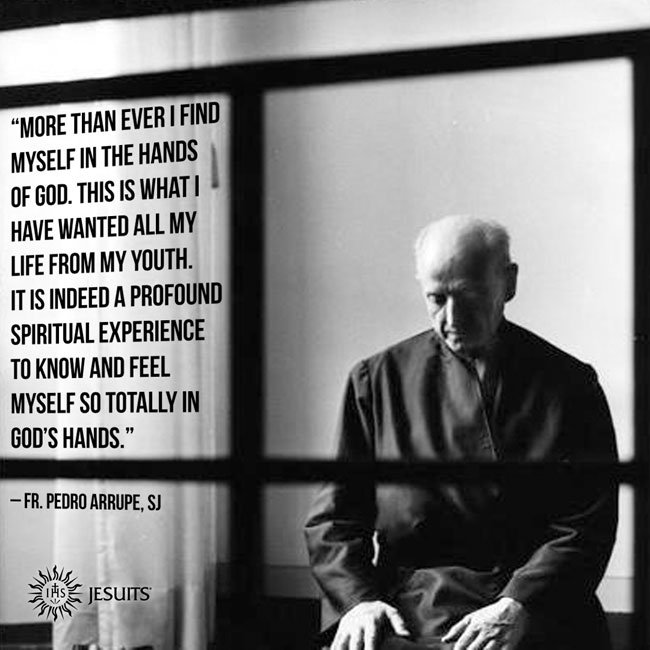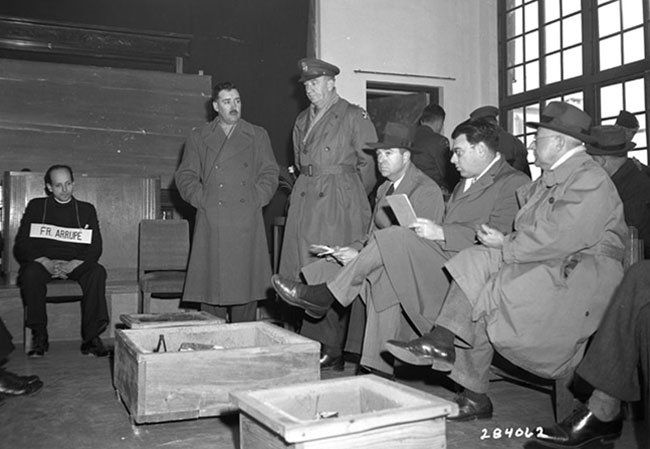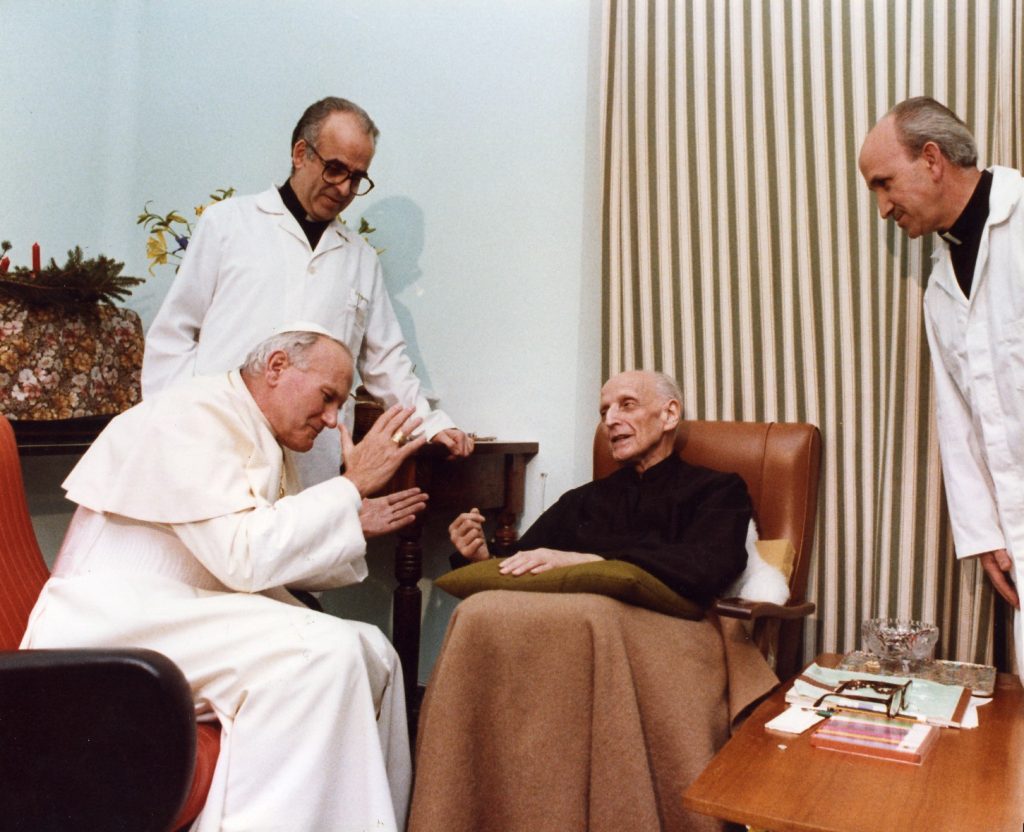Servant of God Pedro Arrupe, SJ
Born: November 14, 1907
Died: February 5, 1991
 Pedro Arrupe, a Spanish Basque and the Society’s twenty-eighth Superior General, was born in Bilbao, Spain. His architect father, Marcelino Arrupe was a man of very staunch faith and was responsible for establishing Spain’s first catholic daily, “La Gaceta del Norte.” Pedro was the youngest in his family with four sisters and grew up in a happy and loving family environment. He lost his mother when he was eight years old and his father, pointing to the statue of the Virgin of Begona, in a small chapel where his mother’s body laid, told him: “From now on, she will be your mother.” Pedro studied with the Piarist Fathers as a young boy in his native city and later went to Valladolid and Madrid’s Central University when he decided to embark on medicine as a career in 1922. Pedro did not complete his medical degree despite being a brilliant student because in his final year after a pilgrimage to Lourdes with his three sisters following the death of their father, he personally witnessed many spectacular miracles taking place. He then decided to “devote his life to curing the ills of the soul instead of devoting his life to curing the ills of the body.”
Pedro Arrupe, a Spanish Basque and the Society’s twenty-eighth Superior General, was born in Bilbao, Spain. His architect father, Marcelino Arrupe was a man of very staunch faith and was responsible for establishing Spain’s first catholic daily, “La Gaceta del Norte.” Pedro was the youngest in his family with four sisters and grew up in a happy and loving family environment. He lost his mother when he was eight years old and his father, pointing to the statue of the Virgin of Begona, in a small chapel where his mother’s body laid, told him: “From now on, she will be your mother.” Pedro studied with the Piarist Fathers as a young boy in his native city and later went to Valladolid and Madrid’s Central University when he decided to embark on medicine as a career in 1922. Pedro did not complete his medical degree despite being a brilliant student because in his final year after a pilgrimage to Lourdes with his three sisters following the death of their father, he personally witnessed many spectacular miracles taking place. He then decided to “devote his life to curing the ills of the soul instead of devoting his life to curing the ills of the body.”
Pedro entered the Society at Loyola on Jan 15, 1927 and after his noviceship and juniorate studies he moved to Ona near Burgos in 1931. When the Society in Spain was dissolved by governmental decree in 1931, Pedro and other young Jesuit students went to Marneffe, Belgium to complete their philosophy. In 1933, Pedro continued with theology in Valkenburg, Netherlands and was ordained there on July 39, 1936. Less than two months later, Fr Arrupe sailed to the United States to complete his theology. Later for his doctoral studies in medical ethics during his tertianship, he studied at St Stanislaus Novitiate in Cleveland, Ohio. He received his assignment to the Japan mission toward the end of his tertianship, as this was in response to a request he had made years earlier to Fr General Ledochowski volunteering for the missions.
 Fr Arrupe arrived at Yokohama, Tokyo, on October 15, 1938 and immediately immersed himself in studying the Japanese language at Nagatsuka, near Hiroshima and within two years he was in charge of a rural parish in the Yamaguchi mission. On the day when Japan declared war on the United States, Fr Arrupe’s residence was searched as he was suspected of being a spy for the western powers. He was kept in solitary confinement for thirty-three days at the unheated Yamaguchi military prison and was released on Jan 12, 1942 after thirty-six hours of continued interrogation. On leaving prison, he thanked the jailer for his “gift” of the opportunity to suffer for Christ. In later years Fr Arrupe referred to this period of imprisonment as the most instructive month of my entire life. He said: “many were the things I learned during this time: the science of silence, of solitude, of severe and austere poverty, of inner dialogue with the “guest of my soul.”
Fr Arrupe arrived at Yokohama, Tokyo, on October 15, 1938 and immediately immersed himself in studying the Japanese language at Nagatsuka, near Hiroshima and within two years he was in charge of a rural parish in the Yamaguchi mission. On the day when Japan declared war on the United States, Fr Arrupe’s residence was searched as he was suspected of being a spy for the western powers. He was kept in solitary confinement for thirty-three days at the unheated Yamaguchi military prison and was released on Jan 12, 1942 after thirty-six hours of continued interrogation. On leaving prison, he thanked the jailer for his “gift” of the opportunity to suffer for Christ. In later years Fr Arrupe referred to this period of imprisonment as the most instructive month of my entire life. He said: “many were the things I learned during this time: the science of silence, of solitude, of severe and austere poverty, of inner dialogue with the “guest of my soul.”
He was appointed Jesuit superior and the master of novices in Japan in 1942. He was living in suburban Hiroshima when the atomic bomb fell on August of 1945. He described that event as “a permanent experience outside of history, engraved on my memory.” He utilized his medical skills in the service of the wounded and the dying, transforming the novitiate into a make-shift hospital for over 200 grievously scarred human remnants. He eventually was appointed the provincial superior of the Jesuits in the Japanese province. Among his accomplishments as provincial were starting the high school in Hiroshima and building in 1962 the shrine in Nagasaki, dedicated to the Japanese martyrs.
At the 31st General Congregation of the Society of Jesus in 1965 he was elected the Society’s 28th Superior General. He served in that position from 1965 to 1981 during which time he promoted the renewal of Jesuit life in accordance with the teachings of the Gospel and the Spiritual Exercises as well as seeing to the Society’s authentic implementation of the directives of the Second Vatican Council. He attended the final session of the Council and participated in five international synods of bishops. He traveled extensively and through his meetings and speaking to countless Jesuits, he became aware of the world’s major needs and of the new opportunities being offered to the Church. Because of his international experience, he was able to perceive that the centre of worldwide Christianity was gravitating toward Africa and Asia. He encountered the ravages of world poverty and was convinced that religious faith as per the teachings of Christ, has to oppose oppression and injustice and to alleviate poverty and eradicate racial discrimination. He was among the first alerted to the world refugee problem and in 1980, he launched the Jesuit Refugee Services (JRS), a programme to meet the needs of the millions of refugees, especially in Asia and Africa.
 Fr Arrupe’s term as general was not totally trouble free. The Society’s membership diminished and there were certain tensions within the Order. He however manifested as a man of God and a man of the Church with extraordinary simplicity and understanding. He was so highly esteemed by his peers that for five consecutive terms he was elected President of the Union of Superior Generals in Rome.
Fr Arrupe’s term as general was not totally trouble free. The Society’s membership diminished and there were certain tensions within the Order. He however manifested as a man of God and a man of the Church with extraordinary simplicity and understanding. He was so highly esteemed by his peers that for five consecutive terms he was elected President of the Union of Superior Generals in Rome.
In the summer of 1981, having visited the Philippines on the occasion of the 400th anniversary of the arrival of the Jesuits to that country he went to Bangkok to visit the Jesuits working among refugees. On his return to Rome, he suffered a cerebral thrombosis upon his arrival at its Fiumicino Airport. In view of his health and his inability to govern, Pope John Paul II, in his usual concern for the Society, appointed Fr Paulo Dezza as his personal delegate to oversee the Society’s everyday government and to prepare for a future general congregation.
Fr Arrupe’s illness lasted for almost ten years. While in the Society’s infirmarian in Rome, he concelebrated Mass daily until 1987 when he suffered a severe setback. His speech became difficult and more limited and he had to be confined to his room. In his final week he fell into a coma. The Pope came personally to impart his blessing on Fr Arrupe and prayed silently at his bedside and asked everyone in the room to recite the Alma Redemptoris Mater with him. Fr Arrupe never regained consciousness and succumbed to the Lord on February 5, 1991 at 7.45 pm. In Japan, it was already the 6th, the feast of the Japanese martyrs. Fr Arrupe was eighty-four years old and had been a Jesuit for sixty-four years, a missionary for twenty-seven, and superior general for eighteen. His funeral was concelebrated by 500 priests at the Society’s Church of the Gesu in Rome.
In response to a request made by the Jesuit delegates attending the 34 th General Congregation in 1955, Fr Arrupe’s cause is now under consideration.
February 5, 2019 — Today, on the 28th anniversary of his death, the cause for the beatification and canonization of Fr. Pedro Arrupe, SJ, the 28th Superior General of the Society of Jesus, officially opens in Rome.
